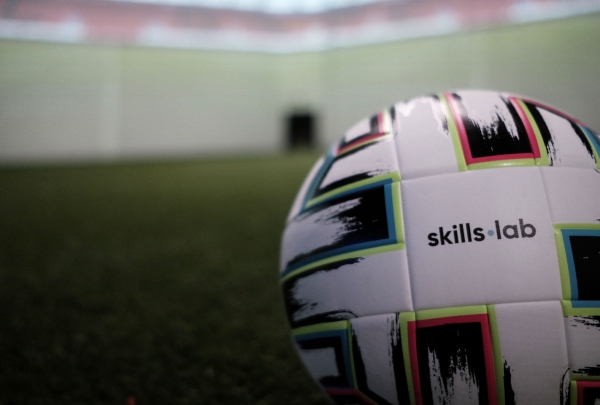
skills.lab: Fabian, you have been training in your club’s own skills.lab Arena since the spring of 2019 – what is your first conclusion after these almost two and a half years?
Reichler: At the beginning, the club and the technology first had to get to know each other, but that was no surprise. Training in the skills.lab Arena was anything but ordinary for coaches and players. For our coaching staff in particular, the initial task was to find out how to make the most out of the many possibilities of the training system. The players got used to it very quickly. Of course, there are always some players who are a bit more reserved at the beginning when it comes to playing in the Arena, but most of them just go in and take off.
skills.lab: You mentioned a process of getting to know each other – is this process completed?
Reichler: Yes, absolutely. The skills.lab Arena is now a full part of FC Ingolstadt – everyone in the club knows it and is familiar with how to use it. We know what is possible in the Arena and how we already use it, but also how we want to use it more in the future. So now we’ve arrived at a phase of optimization in the meantime.
skills.lab: What role does the skills.lab Arena play in your training routines?
Reichler: We use the skills.lab Arena in many different ways. On the one hand, it is used for classic individual training, which means working on strengths and weaknesses of the individual player. Here, the Arena delivers huge advantages with its high repetition frequency. It also plays a central role in rehabilitation training, as we can bring players back to their pre-injury performance level in a very targeted manner. On the other hand, we are also increasingly using the skills.lab Arena as a performance diagnostics tool for football and cognitive skills. For this purpose, we have developed our own assessment battery, which we regularly run through with the players. Additionally, many of our players go to the Arena simply to have fun together in their free time.
skills.lab: Let’s stay with rehabilitation training for a moment – how do you organize such a training?
Reichler: I can speak here primarily for the youth teams. The main contacts for rehabilitation training are always our club’s own physiotherapists. Our physios have the players in for treatment on a regular basis and are therefore always up to date on the individual progress in the rehabilitation process. They consult directly with the coaching team and then jointly determine how often a player will come to the skills.lab Arena during his or her rehabilitation. The physiotherapists then also accompany the players during training in the Arena and take a close look at the movement sequences.
skills.lab: What do you see as the main advantage that the skills.lab Arena offers you in your training routines?
Reichler: In my opinion, the absolute biggest advantage is the high number of repetitions in combination with the reproducibility of the exercises. This makes things possible that would simply not be possible on the pitch. For example, if you are working on your finishing after cross balls in the skills.lab Arena, all the balls will arrive as precisely as they should. This is something we don’t always know from the pitch (laughs). In addition, the training conditions in the Arena are very good all year round.
skills.lab: How often do your players train in the skills.lab Arena?
Reichler: We are clearly focusing on regularity in the training schedule. A group of four from each of our teams comes to skills.lab at least once a week for a regular training session. At the same time, a lot also happens through spontaneity. The players know that they can use the skills.lab Arena for additional sessions when the facility is free. So, for example, if a player is arriving an hour before training, they often head straight to the Arena.
skills.lab: What do your players like most about training in the Arena?
Reichler: Here we see an age-related pattern. Players from our older youth teams love the opportunity to work specifically on themselves and their own skills. For the young players, on the other hand, it’s above all the direct competition with each other that excites them. For many 12- to 15-year-olds, the motto is quite classic: I want to be better than you.
skills.lab: What are your goals for training in the skills.lab Arena?
Reichler: In addition to the already well-established areas of individual training and rehabilitation training, we want to further expand football-specific assessment in the skills.lab Arena this year. Here, the club has clearly set itself the goal of pursuing this path in the long term. The performance diagnostics will give us a uniform picture of all our players. At the same time, we want to collect valuable comparative data for all age groups over the years. With the help of this objective data in combination with specific goals for each player, we will further improve our player development program.
skills.lab: Thank you very much for the interview!
Fabian Reichler is a youth team coach at FC Ingolstadt 04 and the main person responsible for the club’s own skills.lab Arena. In his role, he looks after all organizational matters relating to the skills.lab Arena.